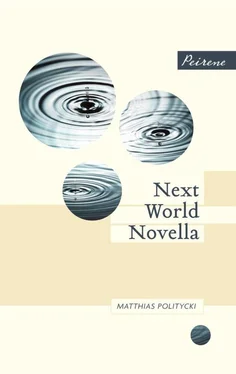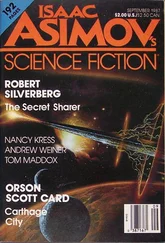Matthias Politycki - Next World Novella
Здесь есть возможность читать онлайн «Matthias Politycki - Next World Novella» весь текст электронной книги совершенно бесплатно (целиком полную версию без сокращений). В некоторых случаях можно слушать аудио, скачать через торрент в формате fb2 и присутствует краткое содержание. Год выпуска: 2011, Издательство: Peirene, Жанр: Современная проза, на английском языке. Описание произведения, (предисловие) а так же отзывы посетителей доступны на портале библиотеки ЛибКат.
- Название:Next World Novella
- Автор:
- Издательство:Peirene
- Жанр:
- Год:2011
- ISBN:нет данных
- Рейтинг книги:4 / 5. Голосов: 1
-
Избранное:Добавить в избранное
- Отзывы:
-
Ваша оценка:
- 80
- 1
- 2
- 3
- 4
- 5
Next World Novella: краткое содержание, описание и аннотация
Предлагаем к чтению аннотацию, описание, краткое содержание или предисловие (зависит от того, что написал сам автор книги «Next World Novella»). Если вы не нашли необходимую информацию о книге — напишите в комментариях, мы постараемся отыскать её.
Hinrich takes his existence at face value. His wife, on the other hand, has always been more interested in the after-life. Or so it seemed. When she dies of a stroke, Hinrich goes through her papers, only to discover a totally different perspective on their marriage. Thus commences, a dazzling intellectual game of shifting realities.
Next World Novella — читать онлайн бесплатно полную книгу (весь текст) целиком
Ниже представлен текст книги, разбитый по страницам. Система сохранения места последней прочитанной страницы, позволяет с удобством читать онлайн бесплатно книгу «Next World Novella», без необходимости каждый раз заново искать на чём Вы остановились. Поставьте закладку, и сможете в любой момент перейти на страницу, на которой закончили чтение.
Интервал:
Закладка:
He didn’t want to think about it.
‘All right, Doro,’ he said hesitantly, raising his voice, ‘if you’re going to start about Dana then please take things in their proper order.’
Even when the children were still at home, and he was glad to get an hour or two in the evenings to devote to the heroic tales of the Tang dynasty or the brushstrokes of Song calligraphy, Doro had sometimes, surprisingly, come back out of her bedroom and over to him at his desk to — well, to say or do what? He had never known what to make of it, and if he asked her for an explanation she quite often went away looking offended. As if she had wanted to bring him out of his shell. Yet these kind of approaches had never been helpful. You have to tackle difficulties head on, systematically, and what use was it now — Schepp was back in the full flow of his perorations, once again speaking emphatically and clearly like a tutor lecturing a difficult examination candidate — what use was it now to drop Dana’s name at the very first opportunity and then abandon him with it? Things have to make sense before they can be cleared up, right?
The Dana business was long ago and forgotten now. Still, at the very least, you should begin at the beginning to leave no room for doubt. And anyway, this wasn’t how he had imagined their farewell, so full of misunderstandings. The beginning had certainly been his operation. No, actually it had all started in his childhood. Even at the age of five he spent most of his time with books, his glasses would have only got in the way playing football. Yes, it had all started in his childhood, which had consisted mostly of being teased. At least he couldn’t be beaten up; he was so short-sighted that he was thought unable to defend himself, almost on a par with a girl. And if it hadn’t started in his childhood then definitely in his youth, a time of renunciation. Where his contemporaries succeeded, he stood aside. Luckily the details eluded him because he saw anything that was more than three to five metres away only in indistinct outline. Of course he noticed that something was going on. He just didn’t let on, learned another language instead. And although at university he was at last considered a genius and quietly admired, he still always had to stand aside when the real prizes were handed out.
Admittedly his tranquil life as a research fellow rather than a university professor had its advantages; he didn’t have to bother with feminist Sinology, or modern business Chinese or even online-chat Chinese, all ghastly prospects for a committed scholar like him, devoted to the study of primary sources. You could escape such horrors only by burying yourself in the ancient texts. Nevertheless he had loved life in his own guarded way, and after all he had been lucky once. Although looking back he couldn’t understand why a woman like Dorothee Wilhelmine Renate, Countess von Hagelstein had chosen him. Then, in the summer of 2003, after more than two wonderful peaceful decades with her, on his doctor’s advice, he had laser surgery on his eyes. Whereupon the tranquillity ended.
It was terrible to see the world in such detail, so sharply outlined, all of a sudden! It had always been so comfortably impersonal in its remote milkiness; Schepp hadn’t felt he was missing anything. Now it dazzled him with a confusingly large number of details — could someone like Doro, who had never had any problems with her eyes, ever have imagined that? Overnight his life seemed like one long missed opportunity. If he had previously renounced a great deal, never complained, he was now determined to make up for it. Schepp developed a need for other people which he had never believed possible. He wanted to participate in just about everything, at least as a spectator. And because of all these needs and wants, peace of mind became a thing of the past.
First he encountered afresh his hand-picked coterie of students. Then he realized that it was possible to go to a nearby bar or café after seminars to continue their conversations in a more informal setting, and to develop relationships. Oh, Schepp was so curious about everything and everyone. He was as hungry for the world as if anything that had satisfied him before no longer counted. As if he had to reinvent himself from scratch and prove himself like a man who had no more excuses left. Not that he had serious ambitions, heaven forbid! But to be open and receptive to everything that previously had been out of sight, out of reach — up to a point, of course; after all, Schepp was married — well, to be receptive to everything there was to be seen and perhaps studied more closely, he should expect that of himself, shouldn’t he?
Then came a hot, humid July evening. The unworldly scholar had turned into a positive charmer and in the protective circle of his students had become familiar with the few bars around the Free University campus. A PhD student had suggested the dimly lit La Pfiff because it was delightfully empty. This is the moment when Dana appears in the picture, although at the time of course no one knew her name; she was merely an unknown woman standing at the bar. At first glance a woman in a trouser suit, everything about her luxurious, accompanied by a gentleman and another lady. At second glance a woman with short hair neatly parted, strikingly pale skin, alarmingly large eye sockets with weary dark eyes. When she turned her bony face with its prominent cheekbones towards the man on her left or the lady on her right, that was sufficiently exciting for a man like Schepp.
And then suddenly he saw her in the arms of the man — no, really the man was in hers — he was unable to fend her off. Schepp drained his glass of red wine in a single swallow. His PhD students could discuss what they liked, he had eyes only for the unknown woman. She surely was going to kiss the man right into the ground any moment now. Then she calmly raised her right leg — or was it her left leg? Made no difference — and wrapped it around his hips, drawing him closer, her tongue working in his mouth unabated as if she wanted to devour him there and then. The next moment, however, she was pushing him away, turning from him to the lady, who had been watching with interest, and smiling.
That ought to have been enough for one evening. But then came the kiss between the two women! At first Schepp was sure his eyes must be deceiving him when he saw the unknown woman in the arms of the other lady, whom she did not just allow to kiss her — by now he really couldn’t believe his eyes — oh no! The lady bit the unknown woman’s neck. When she finally moved away, Schepp saw a mark on the skin. A dark blue tattoo the size of an one-euro coin. A few moments later they were all three standing at the bar as if nothing had happened. Schepp’s mouth was dry. For the rest of the evening he couldn’t help looking over at them frequently, especially at the alluring unknown woman. Soon he was certain about the sign. It sat right over one of the tendons at her throat, small enough to move every time she turned her head, and she turned her head frequently.
Just once that evening her eyes met his, staring him down, forcing him to look away — what a humiliation — before they went on scanning the room. When she finally left with the other two, heading out into a night seemingly so vast that Schepp felt he could see the stars sparkling from where he sat, she passed close to him, and at last he could recognize the sign on her neck, a Chinese character. As he tried to decipher it, he almost became frightened, for he realized that he had seen it often, but where? The curve of the brushstroke was familiar, although it had not been elegantly executed as a tattoo; it was the sign for … what? Schepp mopped his forehead with his handkerchief. It took him some time to realize that such a coincidence was not the work of Fate, least of all deliberately arranged for him. And that he too could go home now.
Читать дальшеИнтервал:
Закладка:
Похожие книги на «Next World Novella»
Представляем Вашему вниманию похожие книги на «Next World Novella» списком для выбора. Мы отобрали схожую по названию и смыслу литературу в надежде предоставить читателям больше вариантов отыскать новые, интересные, ещё непрочитанные произведения.
Обсуждение, отзывы о книге «Next World Novella» и просто собственные мнения читателей. Оставьте ваши комментарии, напишите, что Вы думаете о произведении, его смысле или главных героях. Укажите что конкретно понравилось, а что нет, и почему Вы так считаете.












